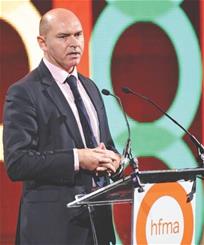News / Q4 measures needed to rein in provider deficits

NHS providers in England have been told they must limit their aggregate year-end deficit to £1.8bn as a condition of getting access to the sustainability and transformation fund (STF) in 2016/17. The STF was announced in the planning guidance for 2016/17, published before Christmas. It will target £1.8bn primarily at providers of emergency care to help them move to a sustainable financial footing.
The STF has two parts: a general element to be distributed to all providers of emergency care, with each trust eligible only if it has met agreed control totals; and a targeted element to support efficiencies and longer-term sustainability. Full details of the latter have yet to emerge.
There are several conditions for access to the general fund (see box), but senior NHS figures were challenged about the likely 2015/16 outturn by Commons Public Accounts Committee chair Meg Hillier. In a hearing on the sustainability and financial performance of acute trusts, she said an acute trust finance director had written to her predicting the 2015/16 outturn would be between £2.5bn and £2.8bn.
Mr Mackey conceded that, before trusts implement measures that will be required in the final quarter, this may be true. ‘To get the figure of £1.8bn, the provider system will end up at a higher number, and then there are other things that will come into play, such as capital revenues transfers and some other accounting adjustments that we will make in the final quarter.’
Curbs on agency spending would also improve the financial position during the final quarter, he added. ‘I understand where that finance director is coming from, and it does look like it is heading towards £2.5bn or perhaps even north of that, but then there are a lot of adjustments that will kick in.’
Monitor and the NHS Trust Development Authority have written to trusts requesting they examine the scope for savings in a number of areas in the last few months of 2015/16. These include local capital to revenue transfers; a review of provisions at month nine; no non-medical agency cover for short-term sickness; compliance with agency spending policy; removing prudence from balance sheet estimates of accrual, deferred income, injury cost recovery and partially completed spells; ensuring maximum VAT reclaim; and asset revaluations.
While the 2015/16 deficit and other historic deficits will have to be dealt with at some stage, NHS Improvement expects the provider sector as a whole to achieve a balanced financial position at the end of 2016/17. Individual trusts may still record a deficit, set as their control total.
‘The important thing is that next year we stop bleeding,’ Mr Mackey told the committee. ‘We will have a transformation fund and a more reasonable efficiency ask and, importantly, providers will then have a bit of breathing space to start thinking about future years.’
HFMA policy director Paul Briddock said the proposed package of improvement measures was a sign of the challenges facing the NHS. ‘Local bodies are already working flat out to minimise the forecast provider deficit for 2015/16,’ he said. ‘The ability to clear deficits next year will clearly be affected by how the service ends this financial year. In this context, it is understandable we should explore all options, including local capital to revenue transfers. But this can only be a one-off measure, as failing to invest in our capital estate as it is needed – and to invest in transformation – will be a false economy and simply shift the problem into a future year.’
|
STF conditions To access the general element of the STF in 2016/17, providers must: Deliver agreed control totals In Q1, they should develop a recovery plan or plan a surplus increase. A control total for 2016/17 and a capital control total must also be agreed. The plans, which should include Carter implementation milestones, should be delivered over the rest of the year. Improve access standards In Q1, performance trajectories should be agreed with NHS England and NHS Improvement, then delivered in Q2 to Q4. Begin transformation |
Related content
The Institute’s annual costing conference provides the NHS with the latest developments and guidance in NHS costing.
The value masterclass shares examples of organisations and systems that have pursued a value-driven approach and the results they have achieved.